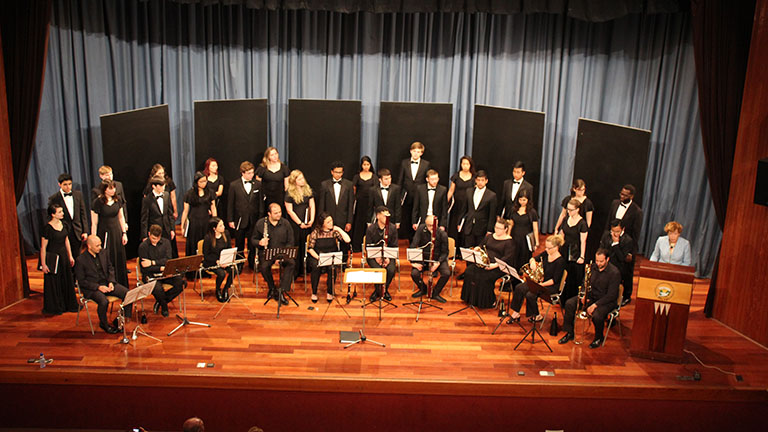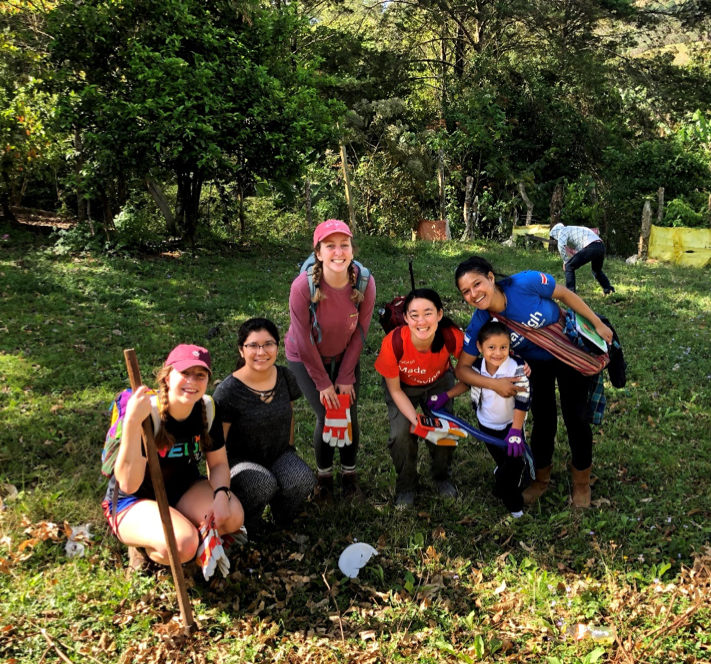
Annual Report 2018 Navigation
Annual Report 2018: Fostering a Global Perspective
Global engagement is essential to Georgia Tech’s aspiration to define the technological university of the 21st century. Education and research platforms and partnerships in Europe, Asia, and Latin America, augmented by dozens of study abroad and exchange programs, help make Georgia Tech one of the most globally oriented universities in the world.
Surveying Sustainable Development and Climate Change in Italy
For students interested in learning about sustainable development and climate change while living in the heart of Venice, a new study abroad program has made that dream a reality.
The Georgia Tech study abroad program on Sustainable Development and Climate Change in Italy is a five-week, six-credit program that launched last May and June. The program offers two courses: Sustainable Development and Climate Change Policy. Alice Favero and Emanuele Massetti, faculty members in the School of Public Policy, co-direct the program. Both lived and worked in Venice before coming to Georgia Tech, and both have ties with the University of Venice and the surrounding research community.
The idea of teaching two of their regular courses in Venice was driven by the desire to merge a firsthand experience of climate change and sustainable development challenges with seminars and interaction with experts.
“It was not possible to move Venice, the Alps, and six international experts to Tech — so we thought we’d move the students to Italy for the summer,” said Favero.
The program enriches standard course content with many curricular and extracurricular activities in a rich cultural environment. Field trips, meetings with experts, and guided tours complement in-class activities.
Students live and study in the heart of Venice in a recently restored (and technologically updated) monastery built in 1423.

The 2017 Liam Legacy Symposium at Georgia Tech featured Jessica Espey, senior advisor to the United Nations, and focused on the U.N. Sustainable Development Goals.
Georgia Tech, Emory, and Spelman Lead New U.N. Regional Centre of Expertise
The United Nations University Institute for the Advanced Study of Sustainability (UNU-IAS) officially acknowledged a new regional sustainability network, RCE Greater Atlanta. RCEs are Regional Centres of Expertise on Education for Sustainable Development. The designation makes Atlanta one of only six Regional Centres of Expertise in the United States.
Georgia Tech, Emory University, and Spelman College are leading the RCE Greater Atlanta for the first two years. Other higher education institutions collaborating on the RCE include Agnes Scott College, Atlanta Metropolitan State College, Clark Atlanta University, Georgia State University, Kennesaw State University, Morehouse College, and University of Georgia.
The RCE Greater Atlanta is a network of multidisciplinary stakeholders, including higher education institutions, businesses, nongovernmental organizations, community associations, and local, regional, state, and federal governments.
All RCE partners are committed to implementing the U.N. Sustainable Development Goals at the local level, specifically goals focused on poverty; hunger; health and well-being; education; sustainable cities and communities; climate action; and industry, innovation, and infrastructure.
“Georgia Tech is honored to be one of the founding leaders of this new regional sustainability network,” said Jennifer Hirsch, director of the Center for Serve-Learn-Sustain and adjunct associate professor of City and Regional Planning at Georgia Tech. “We expect it to facilitate important university-community partnerships that will benefit students, faculty, and the region as a whole, and make Greater Atlanta a leader in education for sustainable development. Being a part of a global network of RCEs will also keep us on the cutting edge of sustainability innovation.”
The idea to form an RCE Greater Atlanta was first presented by Georgia Tech’s Center for Serve-Learn-Sustain in 2016 at a conference the center hosted on social sustainability. Since submitting its application, the network has already developed preliminary strategies and activities, a result of months of research and conversations. Planning and execution of all RCE Greater Atlanta activities will use a network structure, relying on members’ contributions of time and talents, with anchor educational institutions at the hub of the network.
Spring Break Service Trips Offer Global Opportunities
From service trips in Mexico to performances in Cyprus, Georgia Tech students were scattered across the globe during Spring Break 2018.
Collegiate Panhellenic Council sorority members in Senegal.
Senegal
Students representing all Georgia Tech Collegiate Panhellenic Council (CPC) sororities traveled to Senegal to build a school for women. CPC partnered with Circle of Sisterhood, a philanthropy founded by sorority women dedicated to supporting women’s education globally, particularly in nations where they face legal oppression and extreme poverty.
“We are excited to be doing our part to help fight for women and their right to an education,” said Ana Jafarinia, former director of philanthropy for Georgia Tech’s CPC, “particularly since sorority women at Tech are strongly dedicated to their own education.”
In the past, CPC has raised money for Circle of Sisterhood, but this was the first time that students made the trip.

The Chamber Choir performed at the U.S. Embassy in Cyprus, where they held a concert for the U.S. Ambassador to Cyprus and an audience of State Department dignitaries and ambassadors from other countries.
Cyprus
The Georgia Tech Chamber Choir was invited by the U.S. Embassy in Cyprus to perform its first international tour. An ensemble of 24 singers traveled to the island nation to perform and work with area schools to facilitate a cross-cultural dialogue on higher education in the U.S.
“The embassy chose to sponsor us for this opportunity because of the unique ability of the Georgia Tech Chamber Choir members to perform extremely high-caliber music at a level usually only music majors get to do,” said Elianna Paljug, the group’s external vice president and a biomedical engineering major. “This ability to flourish in the arts and in STEM while in college is an opportunity we have enjoyed at Tech, so the embassy will be using us as an example of what American education can offer to potential Cypriot students.”
Uganda
A team from Engineers Without Borders traveled to the east African nation of Uganda to implement a portion of an ongoing project. Their goals for the trip included installing a piping system and expanding infrastructure.
Mexico
Students and staff from the Christian Campus Fellowship (CCF) traveled to Juarez, Mexico, to work with the organization Casas por Cristo to build a home for people in need. This was the CCF’s 25th year traveling to Juarez.

Students traveling to Nicaragua focused their work on environmental preservation and education.
Central America/Caribbean
Among the trips offered by the Alternative Service Breaks (ASB) group were journeys to the Dominican Republic and Nicaragua.
In the Dominican Republic, students taught English through Outreach360, a local organization. Student projects on the Nicaragua trip focused on environmental preservation and education.
Kate Vacko, marketing chair for Alternative Service Breaks, said that the trips “are a great way to meet other Tech students, and they provide an opportunity to explore new cities and cultures. I always look forward to returning to an ASB to remind myself what is really important and why I have always valued service in the first place.”

Wafer-scale processed AlGaN/GaN sensors being tested.
GT-Lorraine Research Could Facilitate Production of Wearable Sensing Devices
A new transfer technique developed by researchers at Georgia Tech-Lorraine could facilitate the production of low-cost wearable, mobile, and disposable sensing devices for a wide range of environmental applications.
The transfer technique’s simple production steps, based on metal organic vapor phase epitaxy (MOVPE), could lower the cost of producing the sensors and other optoelectronic devices. Sensors produced with the new process can detect ammonia at parts-per-billion levels and differentiate between nitrogen-containing gases.
“Mechanically, we just peel the devices off the substrate, like peeling the layers of an onion,” explained Abdallah Ougazzaden, director of Georgia Tech-Lorraine in Metz, France, and a professor in the School of Electrical and Computer Engineering. “We can put the layer on another support that could be flexible, metallic, or plastic. This technique really opens up a lot of opportunity for new functionality, new devices — and commercializing them.”
So far, the research team has transferred the sensors to copper foil, aluminum foil, and polymeric materials. In operation, the devices can differentiate between nitrogen oxide, nitrogen dioxide, and ammonia. Because the devices are approximately 100 by 100 microns, sensors for multiple gases can be produced on a single integrated device.
“Not only can we differentiate between these gases, but because the sensor is very small, we can detect them all at the same time with an array of sensors,” said Ougazzaden, who expects that the devices could be modified to also detect ozone, carbon dioxide, and other gases.
The gallium nitride sensors could have a wide range of applications from industry to vehicle engines — and for wearable sensing devices. The devices are attractive because of their advantageous materials properties, which include high thermal and chemical stability.
Next: ![]() Investing in Community
Investing in Community
Annual Report 2018 Navigation
(text and background only visible when logged in)

